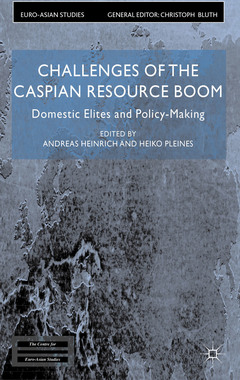Description
Challenges of the Caspian Resource Boom, 2012
Domestic Elites and Policy-making
Euro-Asian Studies Series
Authors: Heinrich Andreas, Pleines Heiko
Language: English
Subjects for Challenges of the Caspian Resource Boom:
Keywords
Approximative price 126.59 €
In Print (Delivery period: 15 days).
Add to cart
Publication date: 08-2012
318 p. · 14x21.6 cm · Hardback
318 p. · 14x21.6 cm · Hardback
Description
/li>Contents
/li>Biography
/li>
A re-conceptualisation of the widely-held concept of the 'resource curse', which contends that resource booms inevitably lead to numerous political, social and economic problems. This book counters that these problems are by no means inevitable, but are rather the direct result of specific policy choices made by actors within particular regimes.
Introduction; A.Heinrich PART I: THEORIES AND CONCEPTS The Rentier State; T.Richter The 'Slippery Slopes' Theory; I.Overland Neopatrimonialism: Concept or Metaphor? G.Erdmann Patron-Client Relations; A.Heinemann-Gruder PART II: PATTERNS OF ELITE INTERACTION AND POLICY-MAKING IN THE ENERGY SECTOR Political Elites in Kazakhstan; T.Umbetalieva & D.Satpaev Kinship and the State in Kazakhstan's Political Economy; E.Schatz The Role of the Oil Elite in Policy-Making in Kazakhstan; J.Kusznir Political Elites in Azerbaijan; F.Guliyev The Role of the Oil Elite in Policy-Making in Azerbaijan ; H.Meissner Politics and the Energy Sector in Turkmenistan; M.Denison PART III: REGULATION OF PROPERTY RIGHTS AND INVESTMENT Foreign Direct Investors and National Politics; B.Brauer Regulating Property and Exploitation Rights of Natural Resources; C.Nygaard National Oil Companies and the State; H.Kjaernet The Role of Corruption in the Governance of the Oil and Gas Industry; H.Pleines PART IV: SPENDING THE PETRO DOLLARS The National Fund of the Republic of Kazakhstan; Y.Kalyuzhnova Managing the State Oil Fund in Azerbaijan; K.Aslanli Providing Welfare in post-Soviet Rentier States; A.Franke Conclusion; A.Heinrich & H.Pleines
Andreas Heinrich is a researcher at the Research Centre for East European Studies, University of Bremen, Germany. His research focuses on energy relations in the former Soviet Union and Eastern Europe.
Heiko Pleines is head of the department of Politics and Economics at the Research Centre for East European Studies and lecturer in comparative politics at the University of Bremen, Germany. He has worked extensively on the influence of non-state actors on political decision-making processes.
Heiko Pleines is head of the department of Politics and Economics at the Research Centre for East European Studies and lecturer in comparative politics at the University of Bremen, Germany. He has worked extensively on the influence of non-state actors on political decision-making processes.
© 2024 LAVOISIER S.A.S.




